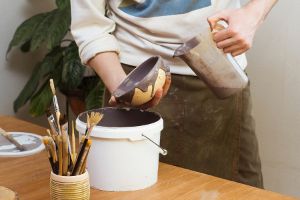
Many people see a new year as the perfect time to start a new hobby. Some leisure time activities aren’t just fun but also healthy since they allow you to relax and destress. However, many people don’t realize that some popular pastimes could inadvertently result in lead poisoning. Let’s look at six hobbies that commonly use leaded materials and what you need to watch out for.
- Pottery Making
- Stained Glass Design
- Jewelry Making
- Painting
- Home Renovations
- Shooting Firearms
The Perils Of Pottery Making
Some glazes and slip clay applications used in ceramics and pottery can contain high lead levels. When heated in a kiln, these materials can release toxic fumes. Always work in a well-ventilated area to protect yourself, and wear a dust mask when sanding or cutting dry clay. In addition, be sure to wash your hands thoroughly after working with clay.
The Danger Of Stained Glass Solder
Stained glass artwork is usually created by soldering pieces of colored glass together. The lead in the solder can leach out and be accidentally inhaled or ingested. To minimize your risk of exposure, work in a properly ventilated space and wear a respirator mask when soldering. Again, wash your hands thoroughly after working with any materials that contain lead, and don’t eat or drink while soldering.
Are Your Jewelry-Making Materials Contaminated?
Designing and creating jewelry is a fun and creative hobby. Most people wouldn’t think it could be dangerous, but some materials, including costume trinkets and metal clay, can contain toxic heavy metals. The best way to protect yourself is to work in a room with good ventilation and wear gloves and a respirator mask when handling any suspect materials. Better yet, avoid using them altogether.
Lead In Paint Can Still Be A Problem
In the past, many paints contained lead to help produce a bright, durable color. You won’t find lead paint in brick-and-mortar storefronts. However, many hobbyists nowadays turn to online shops such as Amazon and Ali Express to purchase cheap hobby supplies. Be careful if you do: paints shipped overseas could contain hazardous additives, including lead, without being labeled as such.
Be Careful When Doing Home Renos
Are you looking forward to a DIY home renovation? Be careful if your home was built before 1978, as it is more likely to have lead-based paint on the walls. Disturbing this paint can create dangerous dust particles. Before you start sanding or tearing down, consider hiring an environmental consulting company to test for lead.
Shooting Firearms
Shooting and training with firearms is a favorite pastime for millions of Americans. However, improperly handled ammo containing lead can make you sick if you aren’t careful. Be sure to wash your hands thoroughly when you’re done shooting or cleaning your weapon, and avoid eating or drinking while at the shooting range.
M3 Environmental Can Help Make Your Hobby Space Safe
If you have a workshop or maker space, it’s essential to keep it safe for yourself and others. One of the best things you can do to protect everyone is to undergo regular environmental testing for lead and other toxins. Contact M3 Environmental today if you are in the Monterey, CA, area and would like to have your hobby space or workshop tested.





